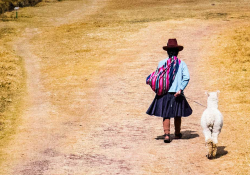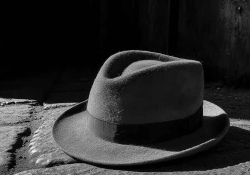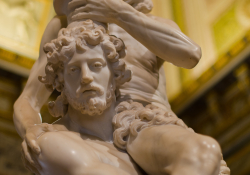Own Voice

While recovering at the hospital following a fall, a woman in her seventies recounts her life living under the thumb of a domineering husband and expresses her wish to dictate to her son a story she was not allowed to write.
Amma is talking to herself.
I could hear her talking to herself presuming that she was talking to me.
It looks like one has to pass time in old age only by hanging on to something or other that doesn’t exist. We had Amma admitted to hospital for the last three days after she had stumbled and fell down in the dark. I stayed with Amma at the hospital to keep her company at night. Amma is past seventy-three years of age.
Recently, Amma has become accustomed to walking in the dark without turning on the electric lights. Even when I chided her so many times and told her not to do that, she would respond, “I’m so used to the dark, Soma. Am I seeing the dark only today or since yesterday? Seventy years have gone by since I’ve started getting used to the dark. Why would I still be afraid?”
“No, Amma. It is not on account of the fear of the dark I’m saying this. What if you fall down?” I would ask.
“Well, if I fall down, then I just have to pass on. It has been so many years since the glowing light in my mind extinguished, son. Now I am a mere physical body.” Saying that, she would keep walking in the dark.
That’s how she fell down and got hurt.
Amma has been like this for the past few years. Sometimes she forgets even the names of the people in the house. She just calls out, “hey, you” or “come here.” “When one gets old, one should reduce weight and get thin. Otherwise, who’ll be able to help one sit on the toilet,” she tells herself on her own. For that reason, she had started reducing her food intake and thereby hurting herself.
When she was young, Amma was rather stout. She attributes the reason for that to Appa.
If I ask her how he was the reason, she would start pouring out her thoughts and recollections.
For your father, there shouldn’t be any food left over. Not knowing what else to do, I would swallow all the leftovers. What could the body then do other than getting fat? Besides going out once a month to visit the temple and my acquaintances, I never went out of the house. Even when I offered to go out to buy something as simple as a coconut shard, your father would go and get it. After marriage, I gave birth to seven kids, and two of them passed away. Even after that many years, your father was still afraid to send me out alone.
In the summer, when he would come to the railway station to send me off for a visit to Sivasu uncle’s house, he would advise me ten times, instead of just once.
As if that was not enough, he would get inside the train and tell the fellow passengers to escort me safely to the destination. It was so embarrassing.
At the same time, I would console myself thinking that he was doing all of that because of his concern for me. You were four or five years of age at the time. I’m not sure whether you remember.
We never realize how the things we do to show our concern for others hurt them. Your father alone would be enough to serve as an example.
We never realize how the things we do to show our concern for others hurt them.
What is the point now of talking about the man who is dead?
Still, even when a man is dead, the hell that he had put others through and the atrocities he had committed do not die with him. They do keep living, at least in someone’s mind, without perishing. Even now if your father’s face appears in my dreams, I’m startled awake.
Your father was bad-mouthing somebody or other all through his life. To him, children take only a secondary place. Such a mind-set!
You’ll get anything only if you ask ten times rather than once.
Soma, I’ve cried for so many days thinking about all of you. Hey, Soma, why did you, your brothers, and all of you have to be born as our children? Have you ever thought about that?
Why were these children conceived in my womb? What did I do to deserve that? Sometimes it feels as though you are all strangers to me. It seems like you are the kids who follow the gypsy for fun, and I am that gypsy.
Soma, when all of you were very little, I was in a constant state of fear that one of you might get lost. I don’t know why I was terrified like that. But such a fear kept bubbling within me like a boiling liquid over the stove.
Even when the children were just playing outside in the street, I would frequently take a peek outside to check if all of them were there. I couldn’t bear it if the children were late coming home from school. If all of a sudden, someone knocked on the door at noon, I would be so frightened thinking that one of them got lost. I would open the door in desperate haste in response.
Your father never had such fear. How is it that a husband never has even a single one of the fears that his wife has?
You know, your sister Lakshmi, she absolutely drove me crazy. She would never stay put at home, even for a little while during the day. While all the boys toed the line and remained at home with no problem, her legs wouldn’t stand still in one place.
On the run. Always on the run. Next door. Next street. She would keep on running to one place or another, or to the library. I used to be so scared thinking that she might get lost somewhere, but nothing like that ever happened.
She studied well, got married, went to Jamshedpur with her husband, settled down there, and even died at age forty-eight before me.
Always in a hurry. In a hurry for everything. Even so, she also might have suffered a lot. She never told me any of that. Children never say many things to those who gave birth to them.
She might have thought that poor mother would be worried thinking about that. But, not saying anything is what hurts the most, son. One day, she appeared in my dream and cried without saying anything. She was bawling. It didn’t even occur to me to comfort her. After she finished crying and wiping her hands, she asked, Amma, did you understand?
I felt a chill run through my body. With my arms and legs shaking, I woke up from my sleep and sat up. My mind went limp. Why did I see her in my dream?
For two days, I couldn’t eat a morsel of food. She had already died. What could I possibly do to help her? Yet, even after death, would the pain emanating from the thoughts never heal? Not being able to sleep thinking about that, I cried for many days.
Soma, if you feel like crying, cry now itself.
It may not be possible for me to comfort you, but I’ll be able to understand your troubles because you are my son. To those who gave birth to children, there is nothing more shameful and humiliating than becoming aware of their children’s troubles only when they are told.
After all, you, your sister, and your brothers were all born tearing a piece of my body with you.
After all, you, your sister, and your brothers were all born tearing a piece of my body with you.
Does anyone come and tell me whether I have pain in my arms or legs? Do I not know that myself? Your troubles and pain are just the same as that.
I come to know about them on my own. I’m not angry with any of you, but I have many regrets. I have anxieties. That is my nature. By not telling anyone what happened to me, I had let it grow within me like a snake pit. The snake pit then grew and covered me fully. No one else is responsible for that.
Soma, I have just one wish. I want to write a story. You’ll be surprised if I tell you this. A short story that I wrote was published in Kalaimagal in 1952. The title of the story was “Destiny.” Do you know who drew the illustrations for the story? Artist Shankar. How wonderfully he drew the illustrations! I don’t know why I wrote the story. I was then recently married, and your older brother was just born at that time. Your father was working as a Tahsildar at Vathalagundu.
I have just one wish. I want to write a story.
There was a library nearby the house where we were staying. I started going to the library during the daytime without your father’s knowledge, brought home the books written by Khandekar, and read them. It felt as though they were written about me. That’s when a story occurred to me. I wrote it the same way as the Khandekar story, using that as an example. After I completed writing the story, I didn’t know what to do afterward.
I asked the librarian. He told me to send it to Kalaimagal and gave me the address. After mailing the short story, I forgot all about it. Four months later, it was published. I could hardly contain my joy when I saw my story in print. When your father came home for lunch, I handed the magazine to him. He asked me whether I wrote the story. I nodded my head. After eating his lunch, he sat on the swing and read it. I was standing with folded arms like a schoolgirl standing in front of the teacher who is marking an exam paper.
After reading the short story, your father sighed heavily. Then he went to the kitchen, took out a matchstick, tore up the pages of the story, and lit them. He didn’t say anything at all. He went upstairs to his room to sleep. I kept looking at the burnt papers. Tears swelled in my eyes. I felt so ashamed. In the evening when he got ready to go out, I brought him coffee and asked him whether he didn’t like the story.
Your father went to the kitchen, took out a matchstick, tore up the pages of the story, and lit them.
“On whose permission did you write the story?” he asked.
I said that I felt like it and wrote it.
“Where did you get the pen from? Who gave you the paper?” he screamed.
It was your old pen that was at home. I went to Nayinaar store and bought the white paper, I said.
“So, you’ve started going to the store alone during the daytime. Tell me, what other sneaky things have you done? Who gave you the idea to send it to Kalaimagal?” I told him everything without hiding anything.
Grinding his teeth, your father said, “I am sending a telegram to your father right now,” and then he went out. Just as he said, he sent my father a telegram asking him to come. My father was a temple accountant, poor guy. Once he knew that his son-in-law was angry, you know what he did? He fell flat on your father’s feet, and holding on to them tightly, he cried, “Please forgive the blunder my daughter committed and accept her.”
That was not enough for your father. “I can’t forgive the blunder your daughter committed. Take her back to your home,” he said. Then he picked up my saree trunks and threw them all outside.
“Oh, no, please don’t say that,” my father said. He then slapped me angrily, and ordered me to ask for forgiveness. “If you ever write a story again, I’ll break your hand and make you lame,” he told me.
I asked for your father’s forgiveness and gave him my solemn promise. Your father accepted me, but when he got angry sometimes, he would throw in an insinuating jibe, “Aren’t you the arrogant one who writes stories? Go ahead and write about this also.”
After that, I gave up reading weekly magazines.
However, without your father’s knowledge, I started writing a story in my mind. I even have a title for that story. You know what the title is? “Snakes and Ladders.” The name of the girl in the story is Saraswathy. That was the name of the girl who went to school with me. I haven’t seen her again since the school days. But I just couldn’t forget her face. So I gave the character that name.
Whenever I was not otherwise occupied, I was writing the story little by little in my mind. I would even be scared about your father finding out about the story in my mind, but he never found that out till the end.
Your father had bought me lots of jewelry. He purchased a house in my name. Every year, he would buy me a silk saree. He had taken me to several temples and holy places, but I’m only an attendant to him. A good servant who submits to his authority. That’s all.
You were gone to Chennai. Your brothers went in different directions. Only your father and I were at home, just the two people. It was simply horrible to stay at home without the children, son. Like a crazy woman, I would keep touching the walls you children used to play with and stroke the beds that you all had slept in.
Your father kept telling me, “Why are you just staying at home all the time? If you want to go to a temple or a holy place, go for a visit.” I think that he probably realized his faults after he got old.
It was I who then didn’t feel like going out.
If you let loose a cow that had habitually been tied to the cow-drawn oil press machine, where would it go? Even after your father had died, it felt as if he was still with me. I just didn’t have the guts to write and publish my second story.
What am I going to accomplish by writing stories at this stage in my life? Still, I can’t help it. I had solemnly promised your father that I would never write again. I can’t break that promise just because he is no more. So, Soma, I’ll tell the story to you.
You write it down and send it to Kalaimagal itself, but put your name on the byline because your father wouldn’t say anything if men write stories. Staying in my mind, the story is hurting me badly like a bleeding sore. In case I die without telling the story, it would be buried with me so pointlessly and unfairly. I wouldn’t be able to bear the burden of such wrongdoing.
In case I die without telling the story, it would be buried with me so pointlessly and unfairly.
Soma, shall I tell you the story? Would you pay attention to me and listen carefully? Do not change any of what I say.
It’s a story only for its namesake. But everything that happens in the story is all true. Isn’t a story always like that? Come closer. Your father might be nearby and listening to it.
Amma was mumbling to herself.
Only the sound of the fan at the hospital was being heard intermittently. Amma became silent.
I woke Amma up and asked her, “Amma, you were saying something about a story. What is it?”
Opening her eyes in a state of confusion, she said, “I don’t know, son. I forgot about it. I’ll tell you if I remember.”
Amma didn’t remember the story at all till she died.
Translation from the Tamil
Editorial note: சொந்தக்குரல் (“Sondhakkural”; Own voice), published in Uyirezhuthu literary magazine (Chennai, 2012), copyright © 2012 by S. Ramakrishnan. English translation copyright © 2022 by Thila Varghese.











